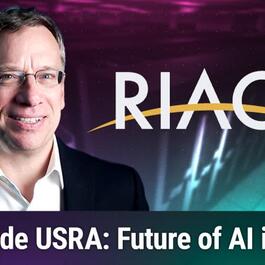
Seems we can't go through an hour without hearing news about artificial intelligence these days. There are a lot of exciting developments, and some of the most exciting when thinking about space are coming from the USRA's Research Institute for Advanced Computer Science (RIACS), which is on the cutting edge of the cutting edge. In this episode, we're speaking with the institute's director, Dr. David Bell, who will walk us through the differences between current AI, agentic AI, and--are you ready?--quantum-powered AI, and their current and future potential to revolutionize space exploration and development. Join us! Headlines Trump budget cuts: The Trump administration's fiscal 2026 "skinny" budget proposes slashing NASA's funding by $6 billion—24 % of its current $24.8 billion—threatening SLS, Orion, Gateway, and Mars Sample Return programs. Planet 9 revival: Scientists re-examining 1980s IRAS and 2006–2011 Akari infrared data have uncovered new gravitational signatures suggesting a hidden Planet 9 at ~700 AU, bringing the search closer to confirmation. Speed-round catch-up: NASA's Psyche asteroid mission is battling low fuel pressure; the decades-old Soviet Cosmos 42 Venus probe is slated to re-enter around May 10; and a recent poll finds over half of Gen Z and millennials believe in alien cover-ups. Main Topic – AI in Space with Dr. David Bell USRA & QuAIL overview: Dr. Bell outlines USRA's Research Institute for Advanced Computer Science (RIACS) and its Quantum Artificial Intelligence Lab—a collaboration with Google and NASA Ames driving AI and quantum computing integration in space missions Career path & pivotal shifts: With 20+ years at USRA and a prior decade at Xerox PARC, Bell traces AI's journey from 1959's first neural nets to the 2017 transformer breakthrough that sparked today's LLM revolution. Early AI successes: AutoClass's unsupervised learning on the 1980s IRAS mission discovered a new class of infrared stars, and ExoMiner's deep-learning engine has since validated over 300 exoplanets from Kepler data. Agent-based autonomy: USRA deployed mobile agents on the ISS to automate file transfers and Deep Space One's Remote Agent performed onboard planning, execution, and anomaly recovery in deep space during the 1990s. Evolution of planning & scheduling: The Europa planning engine—used daily for Mars rovers—has evolved into SPIFe (Spiffy) and real-time collaborative "playbook" apps, optimizing workflows on both robotic and crewed missions. Natural language interfaces: Clarissa, a precursor to Siri deployed on the ISS five years before commercial voice assistants, let astronauts query and navigate complex procedures by voice. Robotic assistants: Projects like Astrobee free-flying robots on the ISS and analog-terrain rover simulations demonstrate how AI-driven machines can support astronauts in exploration and maintenance tasks. Foundation models for Earth & space: USRA's Generative AI Lab is building multipurpose foundation models on global satellite data that now outperform traditional numerical simulations—forecasting weather faster and more accurately. Workforce development: Through the Feynman Quantum Academy and NASA-integrated data science curricula, USRA immerses students These show notes have been truncated due to length. For the full show notes, visit https://twit.tv/shows/this-week-in-space/episodes/159 Hosts: Rod Pyle and Tariq Malik Guest: Dr. David Bell
From "All TWiT.tv Shows (Audio)"


Comments
Add comment Feedback